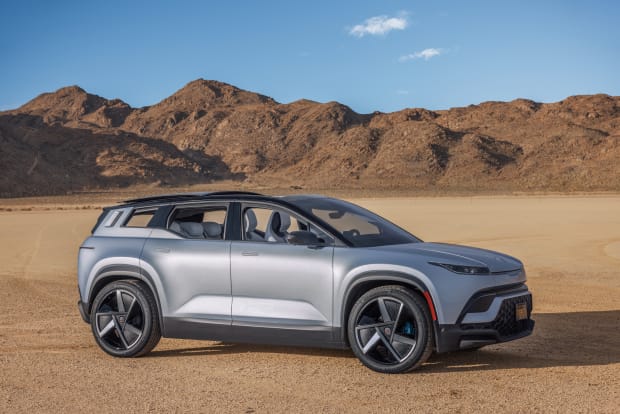Polestar (PSNY) is looking to take on not only electric vehicle giant Tesla (TSLA) in the all-electric SUV market, but also upstart EV maker Fisker (FSR).
The problem, according to some Tesla and Fisker aficionados, is that the Polestar 3 looks awfully familiar.
Polestar on Wednesday unveiled a new electric SUV that it’s hoping will lure U.S. consumers who have a penchant for larger, grocery-fetching cars with lots of storage space but are increasingly keen on vehicles that don’t run on gasoline and plug in.
The new model, called the Polestar 3, is a five-passenger EV that the company describes as a “performance SUV.” The first iteration will come with a 111 kilowatt-hour battery and a dual-motor configuration that Polestar says will deliver up to 517 horsepower and an estimated 300 miles of EPA-rated range.


Priced at about $84,000, the car comes loaded with technology, including an Nvidia (NVDA) computer running advanced driver-assist software developed by Polestar’s part owner, Volvo Cars.
It comes with a very, very familiar look: While auto critics are hailing the Polestar design team as earning their keep, the Polestar 3 sports a not-so-subtle resemblance to Tesla’s popular Model Y crossover, and an even closer resemblance to Fisker’s new Ocean model, which is set to begin mainstream production next month.
There's another lookalike from Chinese EV maker Xpeng (XPEV) as well, the G9 all-electric SUV, though that model is not available in the U.S.
An SUV That's Still Not 'Cheap'
Only one version of the Polestar 3 will be available at launch, though less expensive trims are expected to follow. An optional “Pilot Pack” will add a Luminar lidar unit and other sensors needed for autonomous driving, which Polestar expects to make available in future via over-air updates.
It’s a step up in size, performance, technology and price from the company’s current model, the Polestar 2 crossover, which starts at around $48,000. The Polestar 1 was a limited-production hybrid coupe, now discontinued.


It’s also something of a step up in price from what will likely be its main competitor: Tesla’s Model Y, which costs about $70,000 in similar dual-motor trim. Fisker’s Ocean rings in at $68,999 for the fully-loaded special launch ‘Ocean One” edition, while another potential rival, BMW’s all-electric iX SUV, also starts at around $85,000.
Polestar expects to deliver 50,000 vehicles to customers around the world in 2022. Through September, it had delivered about 30,400, the company said.
Polestar 'May Struggle to Stand Out'
Polestar is a joint venture between Volvo Cars and Chinese automaker Geely, which has owned Volvo Cars since 2010. The company went public on June 24 through a merger with a special purpose acquisition company, or SPAC, Gores Guggheim (GGPI), that was backed by billionaire investor Alec Gores and investment bank Guggenheim Partners.
The company finished its first day of trading at $13 share. Its shares have fallen about 58% since. The stock ended the trading day Wednesday at $5.13.


Wall Street analysts aren't entirely optimistic about Polestar's financial prospects. Redburn analyst Charles Coldicott in September initiated coverage of Polestar with a sell rating, noting Polestar may "struggle to stand out" as competition increases.
Deutsche Bank analyst Emmanuel Rosner is more optimistic. Rosner in August initiated coverage of Polestar with a hold rating and $10 price target, noting that Polestar's "intimate partnership" with Geely and Volvo allows it to create an asset-light business model, speeding time to market, reducing manufacturing and supply risk.







